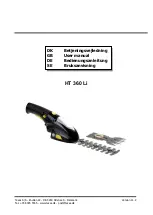
11
English
(2) Regarding the temperature of the rechargeable
battery.
The temperatures for rechargeable batteries are as
shown in
Table 2
, and batteries that have become
hot should be cooled for a while before being
recharged.
Table 2
Recharging ranges of batteries
(3) Regarding recharging time
Depending on the combination of the charger and
batteries, the charging time will become as shown in
Table 3
.
Table 3
Charging time (At 20°C)
4. Disconnect the charger’s power cord from the
receptacle
5. Hold the charger firmly and pull out the battery
NOTE
After charging, pull out batteries from the charger
first, and then keep the batteries properly.
Regarding electric discharge in case of new
batteries, etc.
As the internal chemical substance of new batteries
and batteries that have not been used for an extended
period is not activated, the electric discharge might
be low when using them the first and second time.
This is a temporary phenomenon, and normal time
required for recharging will be restored by recharging
the batteries 2-3 times.
How to make the batteries perform longer.
(1) Recharge the batteries before they become completely
exhausted.
When you feel that the power of the tool becomes
weaker, stop using the tool and recharge its battery.
If you continue to use the tool and exhaust the electric
current, the battery may be damaged and its life will
become shorter.
(2) Avoid recharging at high temperatures.
A rechargeable battery will be hot immediately after
use. If such a battery is recharged immediately after
use, its internal chemical substance will deteriorate,
and the battery life will be shortened. Leave the battery
and recharge it after it has cooled for a while.
CAUTION
䡬
If the battery is charged while it is heated because it
has been left for a long time in a location subject to
direct sunlight or because the battery has just been
used, the pilot lamp of the charger lights for 1 second,
does not light for 0.5 seconds (off for 0.5 seconds). In
such a case, first let the battery cool, then start
charging.
䡬
When the pilot lamp flickers (at 0.2-second intervals),
check for and take out any foreign objects in the
charger’s battery connector. If there are no foreign
objects, it is probable that the battery or charger is
malfunctioning. Take it to your authorized Service
Center.
䡬
Since the built-in micro computer takes about 3
seconds to confirm that the battery being charged
with UC18YGSL is taken out, wait for a minimum of 3
seconds before reinserting it to continue charging. If
the battery is reinserted within 3 seconds, the battery
may not be properly charged.
<UC18YKL>
1. Connect the charger’s power cord to the receptacle.
When connecting the plug of the charger to a
receptacle, the pilot lamp will blink in red
(At 1-second intervals).
2. Insert the battery into the charger.
Firmly insert the battery into the charger till it contacts
the bottom of the charger and checking the polarities
as shown in
Fig. 3
.
CAUTION
If the batteries are inserted in the reverse direction,
not only recharging will become impossible, but it
may also cause problems in the charger such as a
deformed recharging terminal.
3. Charging
When inserting a battery in the charger, the pilot
lamp will light up continuously in red.
When the battery becomes fully recharged, the pilot
lamp will blink in red (At 1-second intervals).
(See
Table 4
)
(1) Pilot lamp indication
The indications of the pilot lamp will be as shown in
Table 4
, according to the condition of the charger or
the rechargeable battery.
Charger
UC18YGSL
UC18YKL
Battery
BSL1415, BSL1815
Approx.40 min.
–
BCL1415, BCL1815
–
Approx.60 min.
Temperatures at
Rechargeable batteries
which the battery
can be recharged
BSL1415, BSL1815,
0°C – 50°C
BCL1415, BCL1815
01Eng_CH14DSL_EE
10/27/10, 1:20 PM
11













































